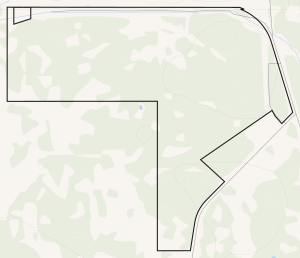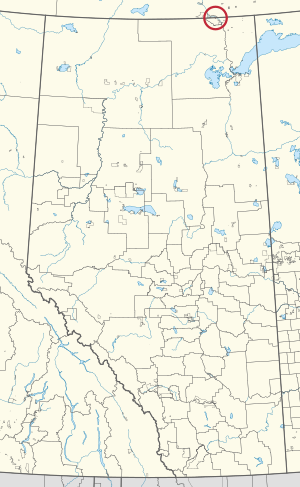Tthebacha Náre 196A facts for kids
Quick facts for kids
Tthebacha Náre 196
Border Town
|
|
|---|---|
| Tthebacha Náre Indian Reserve No. 196 | |

Boundaries of Tthebacha Náre 196
|
|

Location in Alberta
|
|
| First Nation | Smith's Landing |
| Treaty | 8 |
| Country | Canada |
| Province | Alberta |
| Specialized municipality | Wood Buffalo |
| Area | |
| • Total | 397.2 ha (981.5 acre) |
| Population
(2016)
|
|
| • Total | 28 |
Tthebacha Náre 196, also known as Border Town, is a special area of land in Alberta, Canada. It is called an Indian reserve and belongs to the Smith's Landing First Nation. This land is located within the Regional Municipality of Wood Buffalo.
In 2016, a count showed that 28 people lived in Tthebacha Náre 196. They lived in 8 homes out of 16 total houses available.
Contents
What is Tthebacha Náre 196?
Tthebacha Náre 196 is a piece of land set aside for a First Nation community. These areas are called "reserves" in Canada. They are lands where Indigenous peoples can live and keep their traditions.
Who are the Smith's Landing First Nation?
The Smith's Landing First Nation is one of many Indigenous groups in Canada. They are part of the Dene cultural group. Their traditional lands are in northern Alberta and the Northwest Territories.
Where is Tthebacha Náre 196 located?
This reserve is in a very interesting spot! Its northern edge is the 60th parallel north. This line is a border that separates the province of Alberta from the Northwest Territories. Right across this border, in the Northwest Territories, is the town of Fort Smith. This is why it's also called "Border Town."
Understanding Indian Reserves and Treaties
Indian reserves are lands that the Canadian government set aside for First Nations. This happened a long time ago, often through agreements called treaties.
What are Treaties?
Treaties are formal agreements between different groups of people. In Canada, many treaties were signed between First Nations and the Canadian government. These agreements often involved First Nations sharing their traditional lands. In return, they received certain rights and benefits, including the creation of reserves. The Smith's Landing First Nation is part of Treaty 8.
Why are Reserves Important?
Reserves are important because they are places where First Nations can keep their culture and community strong. They are also places where First Nations can govern themselves. This means they make decisions about their own community and land.
 | Percy Lavon Julian |
 | Katherine Johnson |
 | George Washington Carver |
 | Annie Easley |

